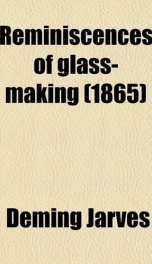reminiscences of glass making

Purchase of this book includes free trial access to www.million-books.com where you can read more than a million books for free. This is an OCR edition with typos. Excerpt from book: workmen, so also was England indebted to the same source. Howell, in one of his " Familiar Letters," directed to Sir Robert Mansell, Vice- Admiral of England, says : " Soon as I came to Venice, I applied myself to dispatch your business according to instruction, and Mr. Seymour was ready to contribute bis best furtherance. These two Italians are the best gentlemen workmen that ever blew crystal. One is allied to Antonio Miotte, the other is cousin to Maralao." Although Sir Robert procured workmen from Venice, they were probably of an inferior character, and a space of fifty years elapsed before the English manufactories equalled the Venetian and French in the quality of their articles. Evelyn, in his " Diary," states: " On the proclamation of James II., in the market-place of Bromley, by the sheriff of Kent, the commander of the Kentish troops, two of the King's trumpeters, and other officers, drank the King's health in a flint wine-glass three feet tall." In the year 1670, the Duke of Buckingham became the patron of the art in England, and greatly improved the quality and style of the flint-glass, by procuring, at great personal expense, a number of Venetian artists, whom he persuaded to settle in London. From this period, i. e., about the commencement of the eighteenth century, the English glass manufactories, aided by the liberal bounties granted them in cash upon all glass exported by them or sold for export, became powerful and successful rivals of the Venetian and the French manufactories in foreign markets. The clear bounty granted on each pound of glass exported from England, which the government paid to the manufacturer, was not derived from any tax by impost or excise previously laid, for all such were returned to the manufacturer, together with the bounty r...
Info about the book
Author:
Series:
Unknown
ISBN:
1112183795
Rating:
4.5/5 (2)Your rating:
0/5
Languge:
English
Users who have this book
Users who want this book
What readers are saying
What do you think? Write your own comment on this book!
write a commentGenre
if you like reminiscences of glass making try:
Other books by this author
Do you want to read a book that interests you? It’s EASY!
Create an account and send a request for reading to other users on the Webpage of the book!

